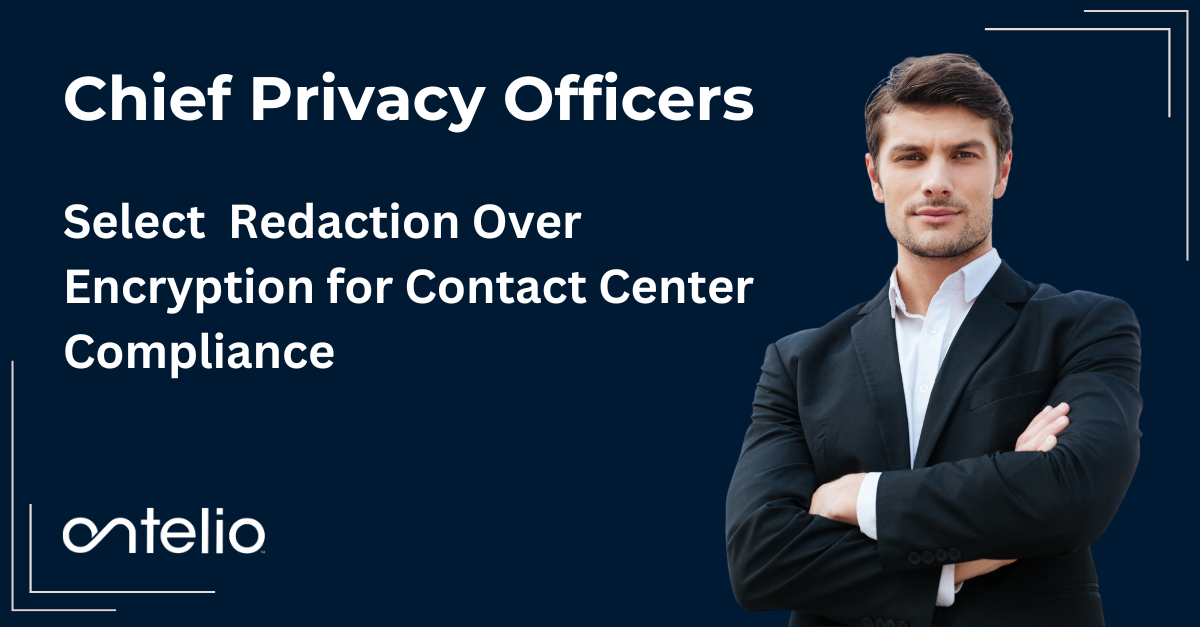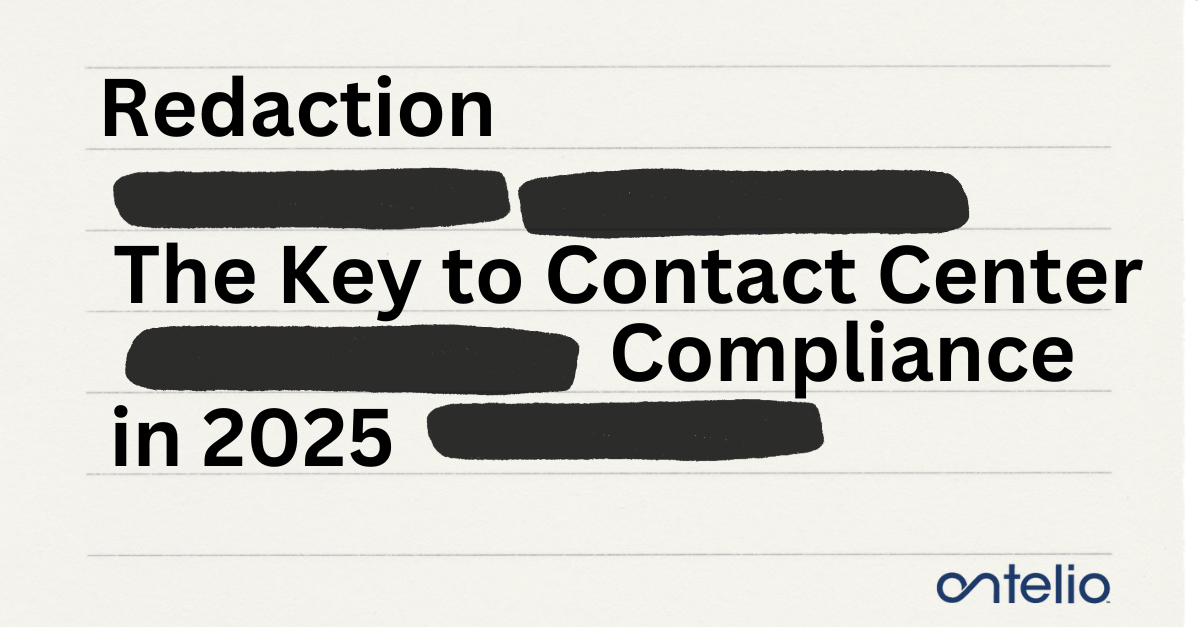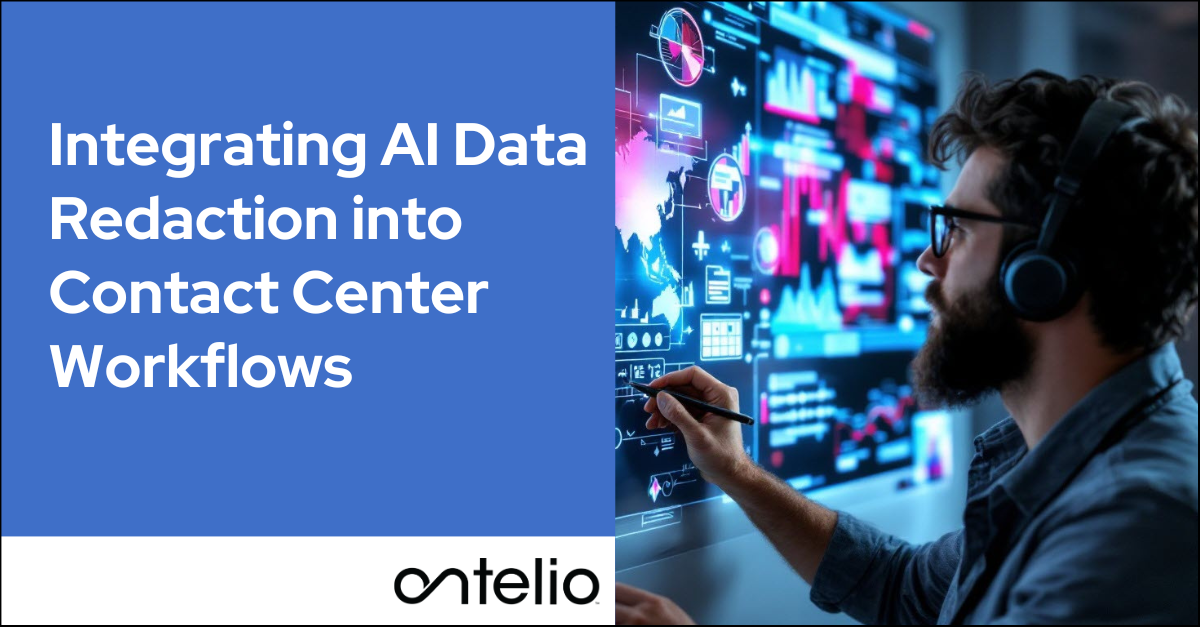3 min read
Ontelio: Ensuring PII, PCI, PHI Data Security & Compliance
Understanding PII, PCI, and PHI: Key Elements of Data Security In the modern digital era, data protection is of the utmost importance....
6 min read
Marcel Fournier Jul 29, 2024 8:54:00 AM

As data privacy regulations evolve and expand globally, Chief Privacy Officers (CPOs) in contact centers confront the challenging task of adhering to intricate international privacy laws. Redaction of call recordings and transcripts, in contrast to mere encryption, emerges as a more effective strategy for ensuring compliance. This approach is closely aligned with the detailed requirements of key regulations like GDPR, CCPA, and PIPEDA, addressing their core principles and mandates.
The contact center industry, as a critical interface between businesses and customers, accumulates vast amounts of personal data daily. This situation places an enormous responsibility on Chief Privacy Officers (CPOs) to ensure compliance with a variety of international privacy laws. While encryption has been a traditional method for protecting data, it often falls short in addressing the specific demands of these laws. Redaction, on the other hand, offers a more targeted approach, aligning better with the requirements of data minimization and purpose limitation inherent in many of these regulations.
Diverse Privacy Laws and Regulations: Each international privacy law brings its own set of challenges. For instance, the GDPR, which applies to any organization processing the data of EU citizens, imposes strict regulations on data processing, including the need for clear consent, rights to access, and the right to be forgotten. The law emphasizes data minimization – the idea that organizations should collect only the data necessary for the intended purpose. On the other hand, the CCPA, a state statute intended to enhance privacy rights and consumer protection for residents of California, USA, includes provisions for data access, deletion, and opt-out rights for consumers regarding the sale of their personal information. While these laws share a common goal of protecting user privacy, their unique requirements pose a significant challenge for contact centers that handle a global customer base. Encryption alone, which secures data but does not address the quantity or nature of the data stored, falls short in meeting these diverse requirements.
Implications for Contact Centers: Contact centers routinely process large volumes of personal data, ranging from basic contact information to more sensitive data like payment details or health information. The varied nature of international privacy laws means that a one-size-fits-all approach to data privacy is impractical. Contact centers must navigate these laws carefully to avoid substantial fines and reputational damage. Encryption, while an important tool for data security, does not aid in reducing the amount of data collected or ensuring it is used for the intended purpose only. In contrast, redaction offers a more nuanced approach, allowing contact centers to retain only the data that is strictly necessary for business purposes and thus better align with the principles of different privacy laws.
Understanding Call Recording Redaction and Encryption: Redaction and encryption serve different purposes in data management. While encryption encodes data to protect it from unauthorized access, it leaves the underlying data intact. This means that all the personal information remains stored and potentially accessible, albeit in a secure form. In contrast, redaction involves permanently removing or obscuring specific data elements within a document or recording. This process ensures that the sensitive information is not just protected but is entirely eliminated or anonymized. In the context of call recordings, redaction can identify and remove or obscure personal identifiers like names, addresses, and other confidential information. This process is aligned more closely with the principles of data minimization and purpose limitation, as it ensures that only necessary data is retained.
Benefits of Redaction Over Encryption: The primary advantage of redaction over encryption lies in its alignment with the principles of international privacy laws. Redaction directly addresses data minimization and purpose limitation requirements by removing unnecessary data. This is particularly important in the context of laws like GDPR, which not only require the protection of personal data but also mandate that unnecessary data should not be collected or retained. Furthermore, in the event of a data breach, encrypted data, if decrypted, can still pose a risk of exposing personal information. Redacted data, however, mitigates this risk significantly as the sensitive information is no longer present in the dataset. Moreover, redaction simplifies compliance with individuals' rights under privacy laws, such as the right to erasure (“right to be forgotten”) under GDPR, as the relevant data can be easily identified and permanently removed.
Data Minimization and Accuracy: Implementing redaction effectively requires a careful balance between data minimization and maintaining the utility of data. This involves identifying what data is necessary for business purposes and what constitutes sensitive information that should be redacted. Advanced AI and machine learning algorithms play a crucial role in this process, as they can analyze call recordings in real-time, accurately identifying and redacting personal data. This technology can discern context, ensuring that only relevant personal data is redacted, thus maintaining the integrity and usefulness of the remaining data. Regular updates and training of these AI systems are essential to keep pace with the evolving nature of language and communication patterns.
Integration with Existing Systems: Integrating redaction technology into existing contact center infrastructure is a critical step towards seamless compliance. This integration should ensure that redaction processes are automatically applied to all relevant data, without disrupting existing workflows. It requires a comprehensive understanding of the current data management systems and the workflow of data through various stages of the contact center's operations. Collaboration with IT departments and vendors is essential to ensure that redaction tools are compatible with existing software and databases. Additionally, staff training is crucial to ensure that employees understand the importance of redaction and how it affects data handling processes.
Regular Audits and Updates: To maintain effective compliance, regular audits of redaction processes are crucial. These audits should assess the accuracy of the redaction, ensuring that all necessary data is being correctly identified and redacted. They should also evaluate the system's alignment with current international privacy laws, which are subject to change. Regular updates to the redaction system are necessary to adapt to new legal requirements, technological advancements, and changes in the types of data processed by the contact center. This ongoing evaluation ensures that the redaction system remains effective and compliant over time.
Real-World Implementations: The real-world effectiveness of call recording redaction is best illustrated through case studies. For instance, a European-based contact center implemented a redaction solution to comply with GDPR. This system was able to identify and redact all EU personal data from their records, including names, phone numbers, and other identifiers. This not only ensured compliance with GDPR but also streamlined their data management processes, making it easier to respond to data access and erasure requests. Another case involves a U.S. contact center that handled calls from multiple states. By implementing a redaction solution, the center was able to comply with varying state-specific privacy laws, such as the CCPA, by redacting data according to each law's requirements.
Cost-Benefit Analysis: While the initial investment in redaction technology may be significant, the long-term benefits far outweigh the costs. The primary benefit is the reduction in the risk of non-compliance with privacy laws, which can result in hefty fines and severe reputational damage. For example, GDPR violations can lead to fines of up to 4% of annual global turnover or €20 million (whichever is higher). By ensuring compliance, redaction technology significantly reduces this financial risk. Additionally, redaction simplifies the process of responding to data access and erasure requests, reducing the operational burden on the contact center. The technology also enhances customer trust, as customers are increasingly aware and concerned about their data privacy. This trust can translate into customer loyalty and a stronger brand reputation, which are invaluable assets in the competitive contact center industry.
Emerging Trends in Privacy Legislation: The landscape of privacy legislation is continuously evolving, with new laws and amendments regularly being introduced. For instance, there is a growing trend towards granting individuals greater control over their data, as seen in the recent amendments to privacy laws in several countries. This trend is likely to continue, with more countries adopting stringent privacy laws and existing laws being updated to address new privacy concerns, such as those arising from advancements in technology. Redaction technology will need to evolve in response to these changes, ensuring that contact centers can continue to comply with the latest legal requirements.
Advancements in Redaction Technology: Looking towards the future of redaction technology, companies like Ontelio are at the forefront of innovation in this field. Specializing in contact center redaction technologies, Ontelio's expertise is showcased through their Censori range of products that cater to the evolving demands of modern contact centers. Their solutions reflect a profound understanding of the unique challenges faced by contact centers in maintaining compliance with international privacy laws.
Here at Ontelio our offerings stand out for their utilization of cutting-edge AI and machine learning algorithms, facilitating highly accurate and efficient redaction. These technologies excel in interpreting context and subtleties in communication, ensuring that redaction is both precise and pertinent. Continually refining these algorithms allows us to stay ahead in addressing new privacy concerns and adapting to legislative changes.
Furthermore, the integration capability of products with existing contact center systems is a testament to our commitment to providing solutions that not only bolster compliance but also integrate seamlessly into existing operational workflows. This is vital for minimizing disruption and ensuring a smooth transition to more sophisticated redaction systems.
As privacy legislation evolves and new challenges emerge, our solutions are designed to be flexible and scalable. This progressive approach places Ontelio as a key innovator in the redaction technology sector, equipping contact centers with the tools necessary to navigate the intricate and ever-evolving landscape of data privacy.
The debate between redaction and encryption is a critical one for contact centers navigating the complex landscape of international privacy compliance. This paper has demonstrated the advantages of redaction in aligning with the principles of modern privacy laws and in effectively managing the risks associated with handling sensitive customer data. Chief Privacy Officers are encouraged to consider redaction as a key component of their data compliance strategy, ensuring that their organizations can adapt to the evolving demands of international privacy legislation.

3 min read
Understanding PII, PCI, and PHI: Key Elements of Data Security In the modern digital era, data protection is of the utmost importance....

Contact centers have become the nexus of customer data exchange, handling sensitive information that ranges from personal identifiers to financial...

Contact centers must efficiently manage vast amounts of customer interactions while ensuring compliance with strict data privacy regulations. AI...